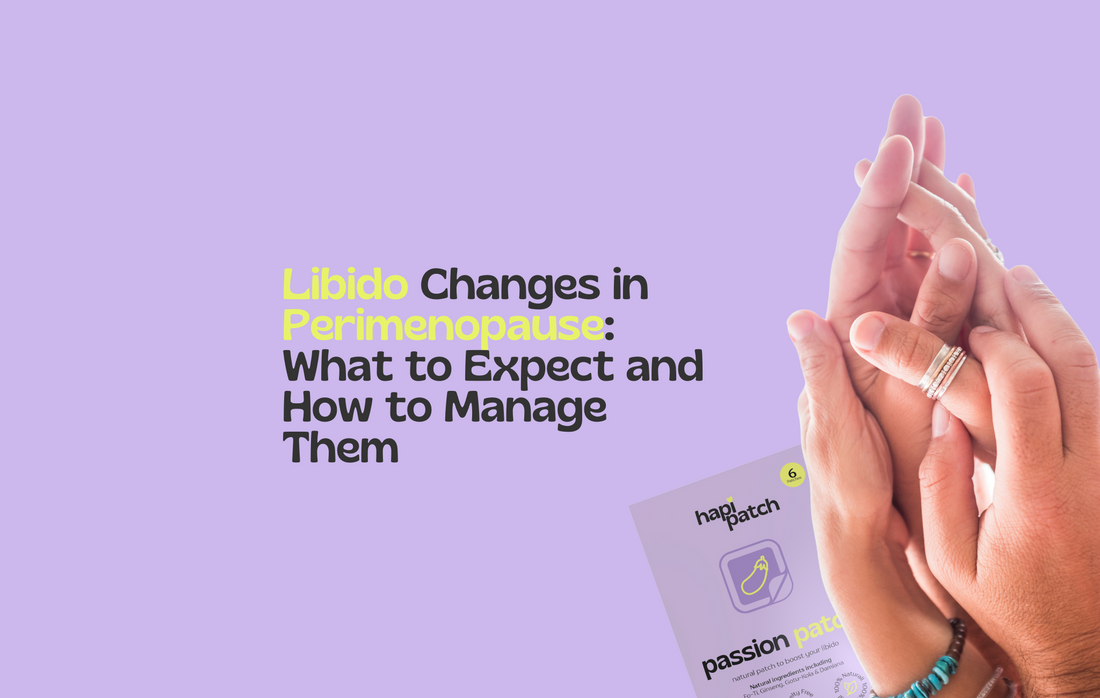Perimenopause, the transitional phase leading up to menopause, is often accompanied by a whirlwind of hormonal changes. For many women, one of the most noticeable effects of perimenopause is fluctuating libido. One day, your sex drive may be higher than ever, and the next, you may feel little to no interest in intimacy. These changes can be confusing and frustrating, but they are entirely normal.
In this blog, we’ll explore how hormonal changes during perimenopause affect libido, what symptoms to expect, and how to manage these fluctuations. We’ll also look at how The Passion Patch can provide consistent support for libido and hormonal balance during this transitional phase of life.
What Is Perimenopause?
Perimenopause is the period leading up to menopause when the body begins to transition away from its reproductive years. It can last anywhere from a few months to over a decade and usually starts in a woman’s 40s, although it can begin earlier or later. During perimenopause, hormone production—especially oestrogen, progesterone, and testosterone—becomes erratic, leading to a wide range of physical, emotional, and sexual symptoms.
Common Symptoms of Perimenopause:
- Irregular periods
- Hot flashes and night sweats
- Mood swings and anxiety
- Vaginal dryness
- Sleep disturbances
- Fluctuating libido
How Hormonal Changes in Perimenopause Affect Libido
The hormonal fluctuations during perimenopause are responsible for the unpredictable changes in libido that many women experience. Understanding which hormones are at play can help shed light on why these changes occur and how to manage them.
- Oestrogen
Oestrogen plays a critical role in maintaining vaginal health and sexual desire. As oestrogen levels fluctuate during perimenopause, many women experience vaginal dryness, thinning of the vaginal walls, and reduced blood flow to the genital area. These physical changes can make intercourse uncomfortable or painful, which can reduce interest in sex.
When oestrogen levels spike, some women may notice an increase in libido. However, when oestrogen levels drop, sexual desire often decreases, and symptoms like dryness or discomfort can further dampen interest in intimacy.
- Progesterone
Progesterone works alongside oestrogen to regulate the menstrual cycle and maintain emotional stability. During perimenopause, progesterone levels decline, which can lead to mood swings, anxiety, and irritability—factors that can negatively affect libido. Many women find it difficult to feel emotionally or physically connected to their partner when dealing with these emotional fluctuations.
- Testosterone
Although testosterone is often thought of as a "male" hormone, it plays a significant role in female sexual health as well. Testosterone supports libido, energy levels, and mood in both men and women. During perimenopause, testosterone levels begin to decline, leading to a reduction in sexual desire and overall vitality.
Common Libido-Related Symptoms During Perimenopause
The erratic nature of hormone production during perimenopause leads to several common symptoms that affect sexual desire:
- Decreased Libido: Many women notice that their interest in sex becomes unpredictable. On some days, sexual desire may feel strong, while on others, it may feel entirely absent.
- Vaginal Dryness and Discomfort: The decline in oestrogen can lead to vaginal dryness, thinning of the vaginal walls, and discomfort during sex. These symptoms can make intercourse less enjoyable and lead to a reduction in sexual activity.
- Fatigue and Low Energy: Hormonal changes often lead to sleep disturbances, fatigue, and reduced energy levels, which can make it difficult to feel motivated for sexual activity.
- Emotional Changes: Mood swings, anxiety, and irritability caused by hormonal fluctuations can make it harder to feel emotionally connected to a partner, which can affect sexual desire.
How to Manage Libido Fluctuations During Perimenopause
While fluctuating libido during perimenopause is entirely normal, there are several strategies you can use to help manage these changes and maintain a healthy sex drive.
- Exercise Regularly
Regular physical activity helps improve circulation, boost energy levels, and support hormonal balance—all of which are essential for maintaining a healthy libido. Strength training, yoga, and cardiovascular exercises like walking or swimming are particularly beneficial for improving sexual health and overall well-being.
- Eat a Hormone-Supportive Diet
Your diet plays a key role in hormone regulation, and eating the right foods can help stabilise hormone levels and improve libido. A hormone-supportive diet includes foods rich in omega-3 fatty acids, magnesium, and zinc. These nutrients support healthy hormone production and can improve energy levels and sexual desire. Foods to include are:
- Fatty fish (such as salmon and mackerel): High in omega-3s, which support hormonal balance.
- Nuts and seeds: Rich in magnesium and zinc, which are essential for hormone production.
- Leafy greens: Packed with nutrients that support energy and hormone balance.
- Manage Stress
Chronic stress can negatively affect hormone levels and libido. When you’re stressed, your body produces cortisol, a hormone that can suppress the production of oestrogen and testosterone. Reducing stress through mindfulness, meditation, yoga, or deep breathing exercises can help lower cortisol levels and improve sexual desire.
- Prioritise Sleep
Getting enough quality sleep is essential for hormone regulation. Sleep disturbances, common during perimenopause, can worsen hormonal imbalances and reduce libido. Aim for 7-9 hours of restful sleep each night to support overall hormonal health and sexual desire.
- Use Lubricants or Vaginal Moisturisers
If vaginal dryness is making sex uncomfortable, using lubricants or vaginal moisturisers can help make intercourse more enjoyable. These products can alleviate the discomfort caused by declining oestrogen levels and help maintain sexual activity.
How The Passion Patch Can Help Stabilise Libido During Perimenopause
For women looking for a natural, non-invasive way to manage libido fluctuations during perimenopause, The Passion Patch offers an ideal solution. This transdermal patch delivers a blend of natural libido-enhancing ingredients directly through the skin, providing continuous support for hormonal balance and sexual desire.
Key Ingredients in The Passion Patch:
- Tribulus Terrestris: Known for its ability to naturally boost testosterone levels, Tribulus Terrestris helps restore sexual desire during perimenopause.
- Ginseng Extract: Ginseng is an adaptogen that helps reduce fatigue and stress, making it easier to feel energised and engaged in intimacy.
- L-Arginine: L-Arginine promotes healthy blood flow, which is essential for physical arousal. By increasing circulation, it supports better sensitivity and sexual pleasure.
- Damiana Extract: Damiana is a natural aphrodisiac that helps improve mood, reduce anxiety, and enhance sexual function, making it easier to enjoy intimacy.
How The Passion Patch Works:
Using transdermal technology, The Passion Patch delivers these active ingredients directly into the bloodstream, bypassing the digestive system for faster and more effective results. The patch’s 4-layered matrix design ensures a steady release of ingredients over 24 hours, providing consistent libido support throughout the day and night.
The Science Behind Transdermal Delivery
Transdermal patches like The Passion Patch are designed to deliver active ingredients through the skin, allowing them to enter the bloodstream more efficiently. Unlike oral supplements, which can lose potency as they pass through the digestive system, transdermal patches ensure that the ingredients maintain their full strength and are absorbed more effectively. This method provides a steady, controlled release of ingredients over time, making it an excellent option for stabilising libido during the unpredictable hormone shifts of perimenopause.
FAQ: Libido Fluctuations During Perimenopause
- Why does my libido fluctuate during perimenopause?
Hormonal fluctuations, particularly in oestrogen, progesterone, and testosterone, cause changes in sexual desire. These hormones regulate libido, and their erratic levels during perimenopause lead to unpredictable shifts in sex drive.
- Can The Passion Patch help stabilise my libido during perimenopause?
Yes, The Passion Patch contains natural ingredients that support hormonal balance, boost testosterone levels, and improve circulation, helping to stabilise libido during perimenopause.
- What lifestyle changes can help improve libido during perimenopause?
Regular exercise, a hormone-supportive diet, stress management, quality sleep, and using lubricants or vaginal moisturisers can all help improve libido during perimenopause.
- What are common symptoms of perimenopause that affect libido?
Common symptoms include vaginal dryness, mood swings, anxiety, fatigue, and decreased testosterone levels, all of which can affect sexual desire during perimenopause.
- How long does perimenopause last?
Perimenopause can last anywhere from a few months to over 10 years, depending on the individual. It typically begins in a woman’s 40s, but it can start earlier or later.

